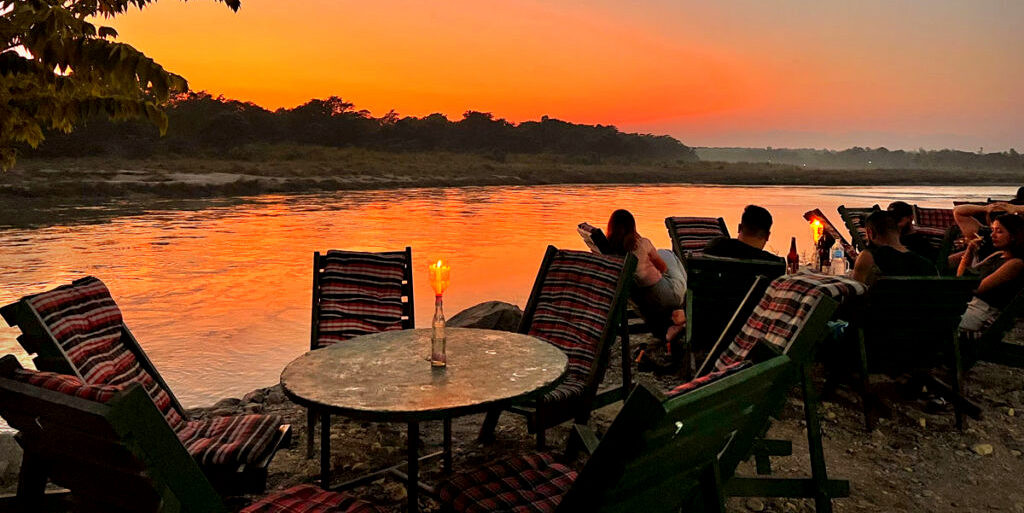Chitwan National Park Safari
A safari in Chitwan National Park is a must-do for anyone visiting Nepal. As one of Asia's premier wildlife reserves, Chitwan offers an unparalleled opportunity to see some of the most unique and rare species in their natural habitats. Here’s what you can expect during a safari adventure in this exceptional park:
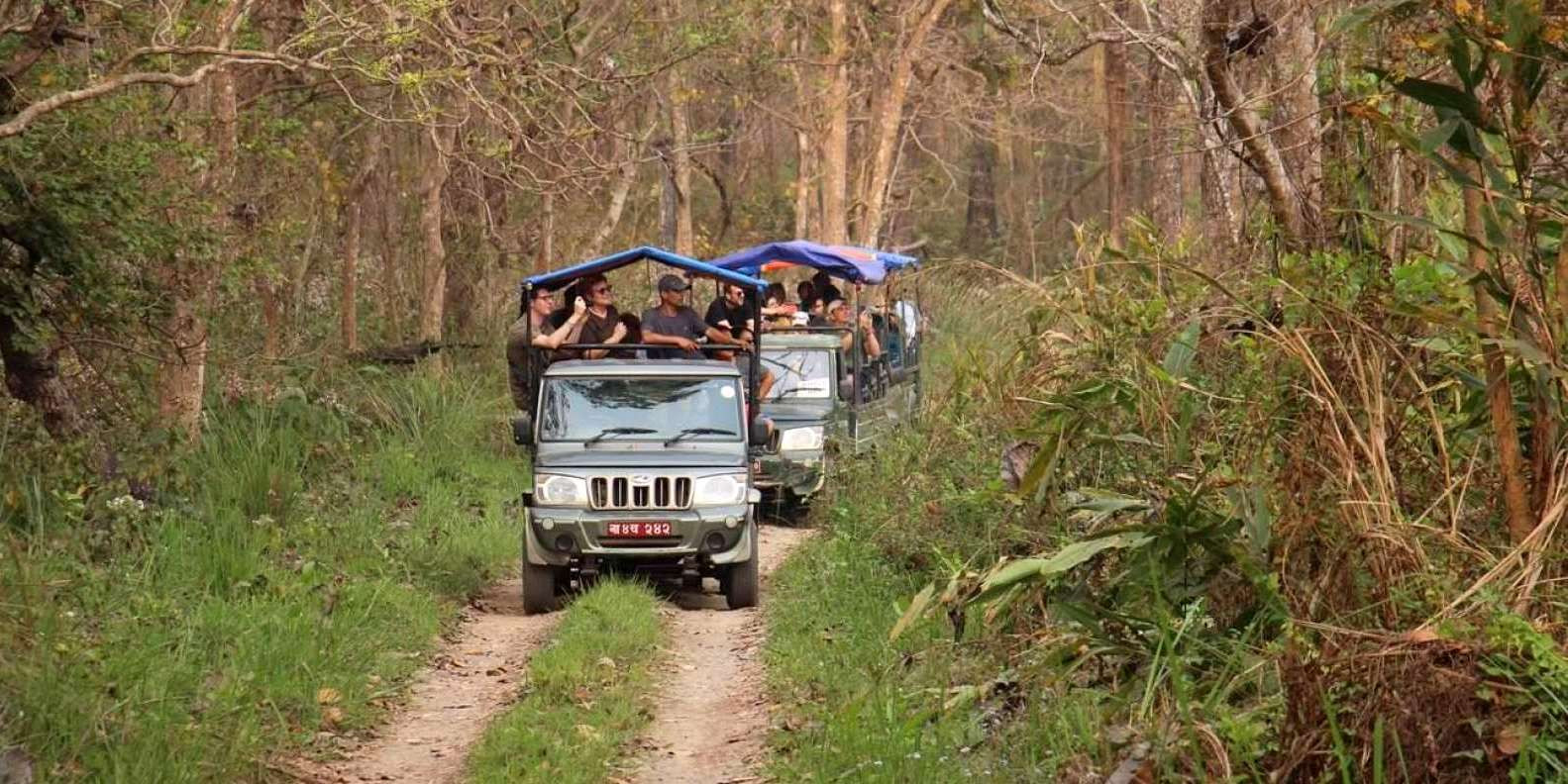
-
Safari Experience: Chitwan National Park safaris are typically conducted in 4x4 vehicles, allowing you to cover wide areas of the park in comfort and safety. These vehicles are specially designed to navigate the rugged terrain and provide excellent viewing opportunities. You can also opt for more traditional and eco-friendly modes of exploring, like elephant-back safaris or even on foot with a jungle walk.
-
Wildlife and Biodiversity: The park is home to over 50 species of mammals, over 500 species of birds, and 55 species of amphibians and reptiles. During your safari, you're likely to see the one-horned rhinoceros, a hallmark of Chitwan, and with some luck, you might spot the elusive Royal Bengal tiger. Other wildlife includes Asiatic elephants, several species of deer, sloth bears, leopards, and an incredible variety of birdlife.
-
Guided Tours: Guided tours are led by experienced naturalists who are knowledgeable about the wildlife and ecology of the park. These guides enhance your safari by providing fascinating insights about the behaviors and habitats of the animals you encounter. They also play a crucial role in spotting wildlife and ensuring that your safari is both educational and exciting.
-
Conservation Efforts: Chitwan is not just a tourist attraction but also a critical conservation site. The park’s efforts have been pivotal in the preservation of several endangered species. By participating in a safari, visitors contribute to the local economy and the ongoing conservation initiatives, helping to ensure the park remains a safe haven for its inhabitants.
-
Additional Activities: In addition to jeep and elephant safaris, visitors can engage in canoeing trips along the Rapti River, where they can see crocodiles and a variety of water birds. The park also offers opportunities for bird watching and cultural experiences, providing a well-rounded and immersive natural experience.
Safari in Chitwan National Park is not just about adventure and wildlife spotting; it's also about contributing to and learning about conservation efforts that help preserve this incredible ecosystem for future generations.
Elephant Safari in Chitwan
An Elephant Safari in Chitwan is one of the most enchanting and traditional ways to explore the dense jungles and diverse wildlife of Chitwan National Park. Riding atop these magnificent creatures offers a unique perspective and an unforgettable experience. Here’s what you can expect and why an elephant safari is a must-do when visiting Chitwan:
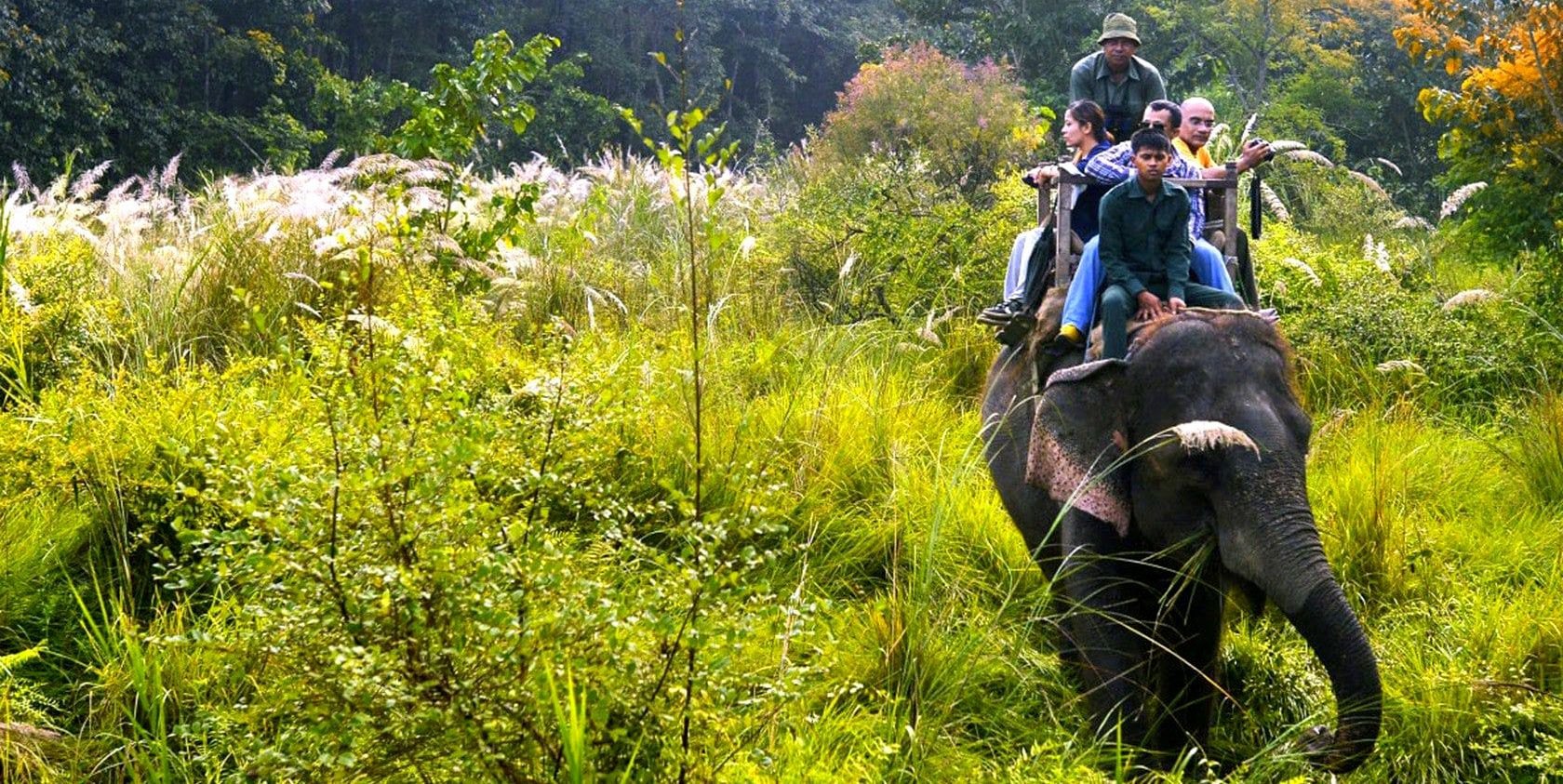
-
Unique Perspective on Wildlife: Elephant safaris allow you to get up close and personal with the park's wildlife in a way that few other modes of travel can offer. From your elevated position on the elephant's back, you have a vantage point that provides broader visibility over the tall grasses, which often conceal animals like the one-horned rhinoceros, deer, and various bird species. This unique perspective can also enhance your chances of spotting some of the park’s more elusive creatures, including leopards and even the majestic Royal Bengal tiger.
-
Eco-Friendly and Ethical Considerations: While elephant safaris have been a popular attraction, it’s important to choose operators who adhere to ethical practices in terms of animal welfare. Responsible tour operators like Relax Getaways ensure that the elephants are well cared for, that their load is limited, and that they are treated with respect and kindness. This commitment not only contributes to the welfare of the elephants but also provides a guilt-free experience for visitors.
-
Immersive Jungle Experience: Traversing the jungle on the back of an elephant allows for a deeper connection with nature. The gentle pace and the ability to access areas that are otherwise difficult to reach by foot or vehicle make this an exceptionally immersive experience. The quiet, unhurried approach also increases the chances of witnessing natural behaviors of the wildlife, without the noise and intrusion of a motor vehicle.
-
Cultural Connection: Elephant safaris also offer a cultural tie to the region’s history and the traditional practices of the local Tharu community, who have lived in harmony with these majestic animals for centuries. Participating in an elephant safari gives insight into the historical and cultural significance of elephants in Nepal and their role in the exploration and conservation of Chitwan.
-
Safety and Comfort: Elephants are known for their stability and calm demeanor, making them a safe choice for families and visitors of all ages. The rides are typically slow, allowing you to take in the scenery and capture photographs of the wildlife and lush landscapes.
-
Guided Experience: All elephant safaris in Chitwan are conducted with an experienced mahout (elephant handler) who guides the elephant through the park. Many safaris are also accompanied by a naturalist or guide who can provide interesting facts about the animals and the ecosystem, enhancing the educational value of the safari.
An Elephant Safari in Chitwan offers a profound way to explore the park’s rich biodiversity, providing a direct connection to nature and an appreciation for the majestic animals that call it home. It’s a truly magical experience that leaves a lasting impression on all who undertake it.
Canoe Trip Rapti River
A Canoe Trip on the Rapti River is one of the most serene and picturesque activities you can enjoy in Chitwan National Park. This gentle river meanders through the heart of the park, providing a peaceful way to observe the rich biodiversity of the area from a unique water-level perspective. Here's what to expect on a canoe trip on the Rapti River:
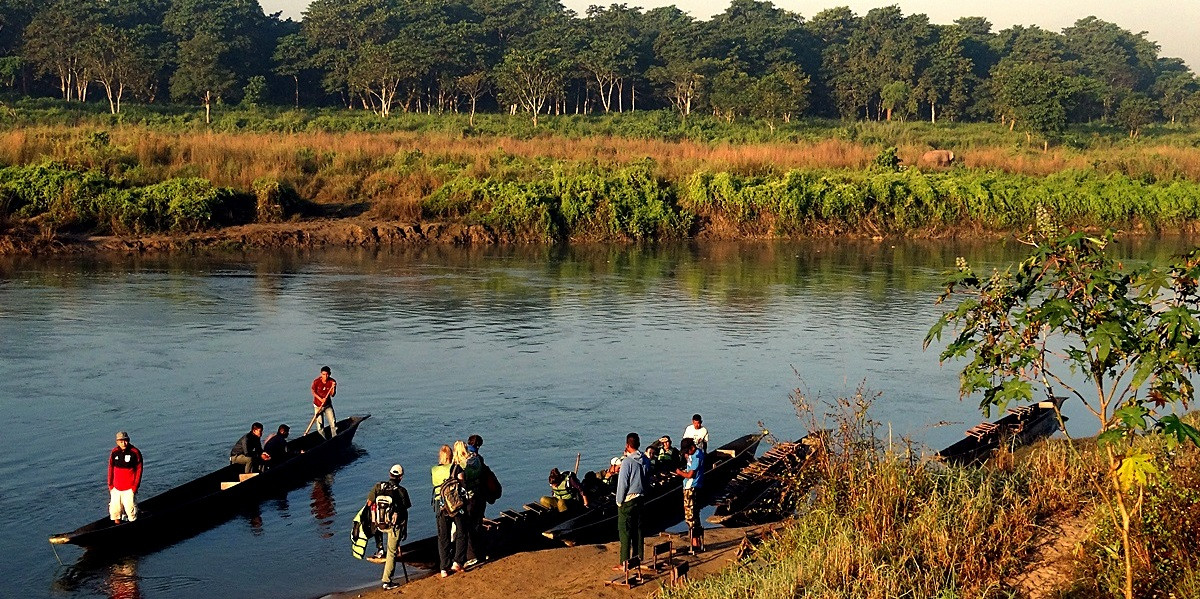
-
Peaceful Exploration: Canoeing on the Rapti River offers a tranquil experience, far removed from the usual noise and haste of everyday life. As you glide silently through the water, you can soak in the lush scenery and the quiet sounds of the jungle. This activity is especially appealing for those looking to unwind and reconnect with nature in a calm setting.
-
Wildlife Sightings: The riverbanks of the Rapti are bustling with wildlife. As you navigate the waters, keep an eye out for marsh mugger crocodiles sunbathing on the shores, and the rarer gharial crocodiles, distinguished by their long, narrow snouts. The river is also a haven for various aquatic birds, making it a fantastic spot for bird watching. Species commonly seen include kingfishers, egrets, and cormorants, as well as a variety of herons.
-
Unique Perspective on the Ecosystem: A canoe trip provides a different vantage point of the park’s ecosystem. You're likely to see details and wildlife that are less accessible or noticeable from land. The proximity to the water surface allows for up-close encounters with the river’s inhabitants and offers a deeper understanding of the aquatic ecosystem.
-
Guided Experience: Canoe trips are typically guided by experienced locals who know the river well. These guides not only ensure safety but also enrich the experience by sharing their knowledge of the river’s ecology, the species that inhabit it, and stories about the area. Their expertise enhances the enjoyment and educational value of the trip.
-
Combining Activities: Many visitors choose to combine a canoe trip with other activities such as a jungle walk or a visit to the elephant breeding center. Starting the day with a peaceful canoe ride can be a soothing way to ease into more vigorous activities later on.
-
Environmental Impact: Canoe trips are eco-friendly, as they do not involve motorized boats and therefore do not pollute the water or disturb the wildlife with noise. This makes it an excellent choice for environmentally conscious travelers.
A canoe trip on the Rapti River is a must-do for those visiting Chitwan National Park. It’s not only a relaxing way to explore the area but also provides ample opportunities for wildlife observation and photography, all while being gently cradled by the flowing waters of the Rapti.
Bird Watching in Chitwan
Bird watching in Chitwan National Park is an exceptionally rewarding activity for both avid birders and casual nature lovers. The park's diverse ecosystems, which include grasslands, forests, and wetlands, create an ideal habitat for a wide variety of bird species. Here's what you can expect and some tips for making the most out of bird watching in Chitwan:
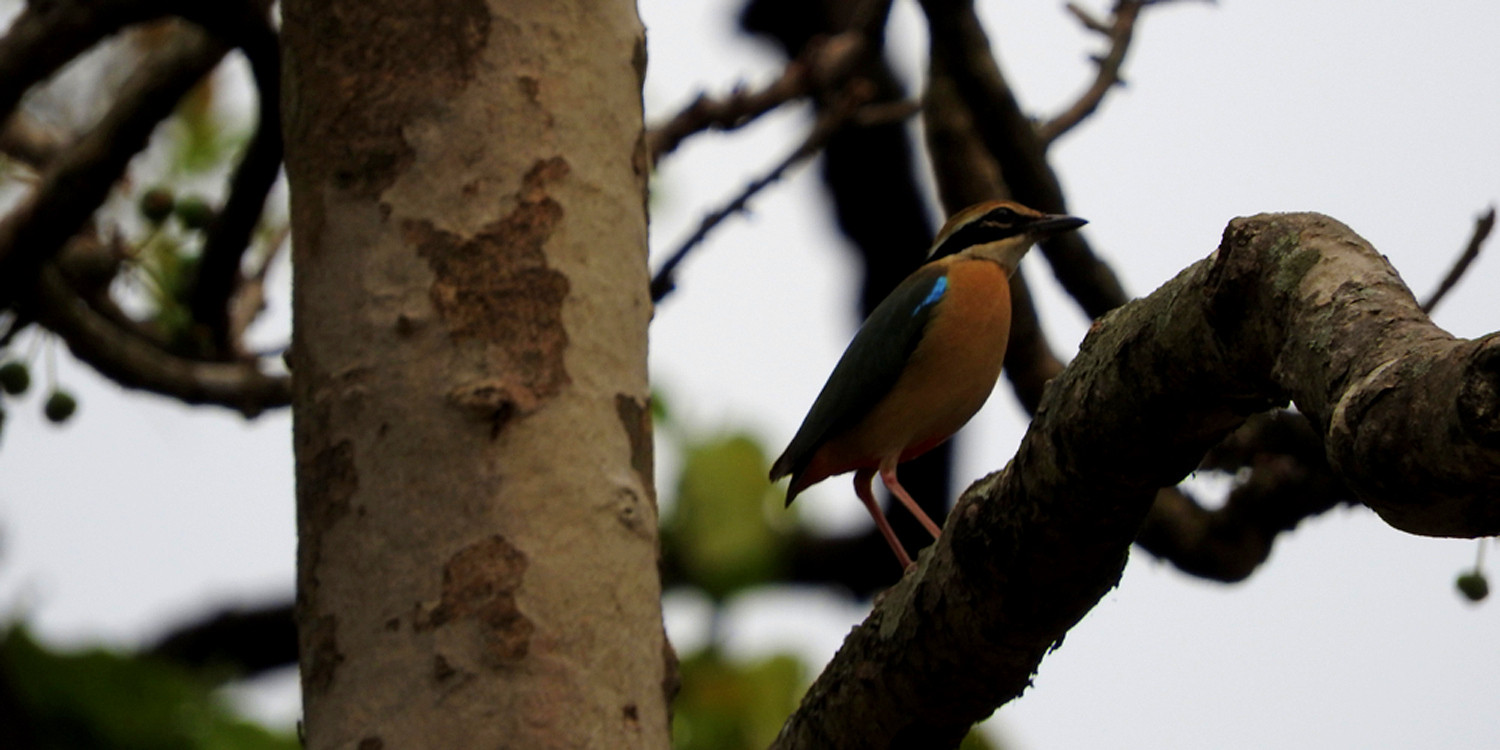
-
Rich Avian Biodiversity: Chitwan is home to more than 500 bird species, making it one of the best bird-watching destinations in Asia. The park's bird population includes both resident and migratory species, encompassing a wide array of colorful and rare birds. Noteworthy species include the endangered Bengal florican, the giant hornbill, the paradise flycatcher, and several types of eagles, vultures, and owls.
-
Ideal Bird Watching Conditions: The diverse habitats in Chitwan, from dense forests to open grasslands and vibrant riverine woodlands, offer numerous opportunities to observe different bird species in their natural environments. The presence of the Rapti and Narayani rivers also attracts many aquatic birds, enhancing the variety of species you can see.
-
Guided Tours: To maximize your bird-watching experience, it’s advisable to join a guided tour. Experienced guides from local tour operators, like Relax Getaways, have an in-depth understanding of the behavior and locations of various bird species throughout the park. They can help you spot and identify elusive and camouflaged birds that you might miss on your own.
-
Seasonal Variations: While bird watching can be enjoyed year-round in Chitwan, the migratory seasons—spring (March to May) and autumn (September to November)—offer the chance to see a greater diversity of species as migratory birds pass through the area. The park's resident birds are present all year, but the cooler months from October to February provide the most comfortable climate for spending extended periods outdoors.
-
Equipment and Preparation: For the best bird watching experience, it’s recommended to bring binoculars, a bird guidebook specific to the region, and a camera with a good zoom lens. Wearing clothing that blends into the natural environment and remaining as quiet as possible will help avoid disturbing the birds and enhance your chances of observing them up close.
-
Conservation Efforts: Chitwan National Park is involved in various conservation efforts to protect its bird populations. By participating in bird-watching tours, visitors contribute to these efforts, as part of the tour proceeds often goes towards conservation and research projects.
Bird watching in Chitwan is not just about spotting a variety of birds; it’s also an opportunity to immerse yourself in the tranquil beauty of the park and appreciate the delicate balance of its ecosystems. Whether you’re a seasoned birder or a newcomer to bird watching, Chitwan offers a delightful and educational outdoor activity that connects you with nature in a profound way.
Tharu Cultural Experience
The Tharu Cultural Experience in Chitwan offers a fascinating glimpse into the lives of the Tharu people, an indigenous ethnic group native to the Terai region of Nepal. This cultural immersion provides an opportunity to learn about the Tharu community's rich heritage, unique traditions, and sustainable lifestyle, which have been harmoniously integrated with the local ecology for centuries. Here’s what to expect when participating in a Tharu Cultural Experience in Chitwan:
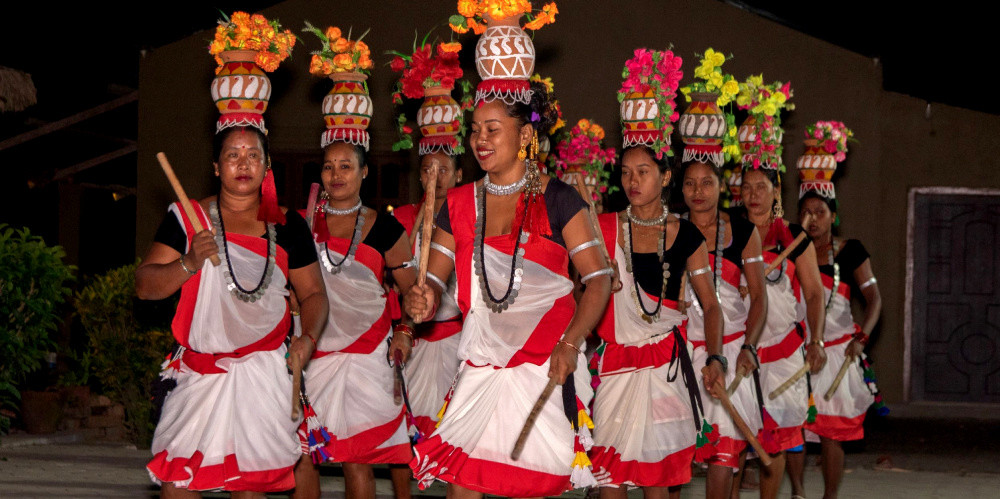
-
Village Tours: A typical Tharu Cultural Experience includes a guided tour of a Tharu village. Visitors will have the chance to see the distinctive mud and thatch houses, which are beautifully decorated and designed to be cool inside, even in the heat of the Terai. These tours often provide insights into the daily lives of the Tharu people, including their farming practices, craftwork, and cuisine.
-
Cultural Performances: One of the highlights of the Tharu Cultural Experience is the traditional dance and music performances. Tharu dances like the Sakhiya and Jhijhiya are performed during festivals and special occasions, featuring rhythmic movements and vibrant costumes. These performances are not only entertaining but also rich in symbolism and history, reflecting the community’s close connection to nature and agriculture.
-
Museum Visits: Some Tharu cultural tours include visits to local museums dedicated to preserving Tharu heritage. These museums showcase traditional clothing, farming tools, fishing equipment, and household items, providing a deeper understanding of Tharu history and cultural practices.
-
Interaction with Locals: Engaging with Tharu villagers is an integral part of the cultural experience. Many tours encourage interaction with local families, offering a chance to participate in cooking traditional meals or learning about the medicinal herbs used in Tharu households. These interactions are invaluable for gaining a genuine insight into Tharu life and their sustainable living practices.
-
Art and Craft: The Tharu are known for their skilled craftsmanship, particularly in basket weaving and pottery. Visitors can observe these crafts being made and sometimes participate in workshops to learn the techniques firsthand. These activities not only support the local economy but also help preserve the cultural crafts for future generations.
-
Educational Aspect: Guided tours are often educational, explaining the history of the Tharu people, their migration patterns, and how they have adapted to life in the dense jungles of the Terai region while maintaining a low ecological footprint. This educational aspect makes the cultural experience both informative and enlightening.
-
Ethical and Sustainable Tourism: Choosing a Tharu Cultural Experience supports sustainable tourism and provides economic benefits to the local community. It promotes cultural preservation and helps the Tharu people maintain their traditions in a rapidly modernizing world.
Participating in a Tharu Cultural Experience in Chitwan is more than just a tourist activity; it’s an immersive journey into the heart of Nepal’s indigenous culture. It offers a unique opportunity to learn about and appreciate the Tharu way of life, marked by resilience, sustainability, and a deep respect for nature.
Chitwan Jungle Walk
A Chitwan Jungle Walk offers an intimate and thrilling way to explore the diverse ecosystems of Chitwan National Park, providing a closer look at the rich flora and fauna of the area. Walking through the jungle on foot puts you at eye level with the smaller intricacies of the park that are often missed during jeep or elephant safaris. Here's what you can expect during a Chitwan Jungle Walk:
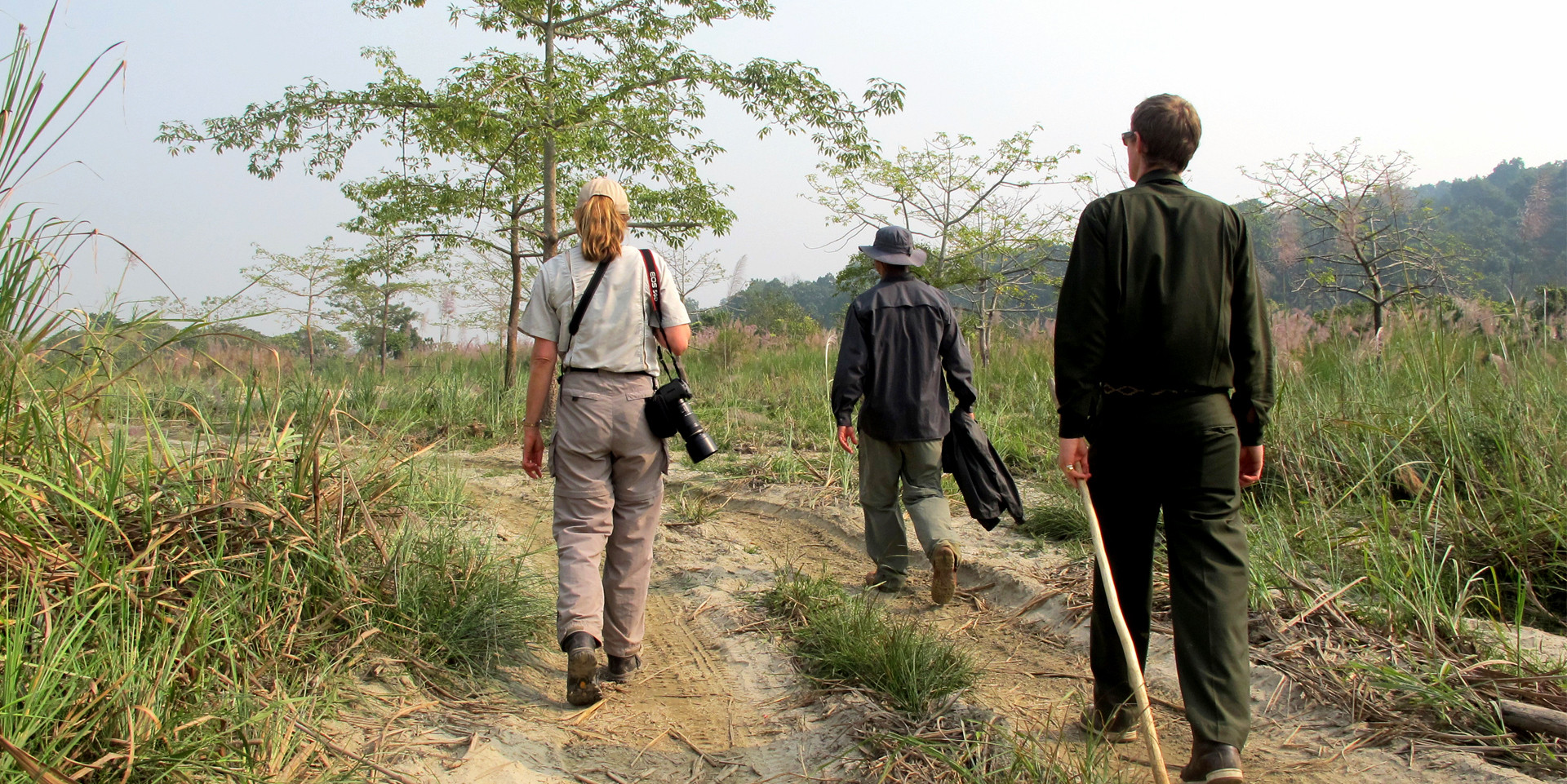
-
Direct Interaction with Nature: Walking through the jungle allows for a more personal connection with the environment. You're likely to encounter a variety of plant species, insects, and smaller wildlife that inhabit the forest floor and underbrush. This slower pace and closer proximity make it possible to appreciate the smaller details of the jungle ecosystem.
-
Wildlife Sightings: While large animals like rhinos and tigers are occasionally spotted during jungle walks, the focus often shifts to looking for smaller game such as various species of birds, butterflies, and perhaps even spotting a sloth bear or a barking deer. Guides are skilled at spotting and identifying animal tracks, nests, and calls, enhancing the experience by explaining the habits and habitats of these creatures.
-
Experienced Guides: Guides are essential for a Chitwan Jungle Walk, not only for safety reasons but also to enhance the educational value of the walk. They provide insights into the ecological balance of the forest, medicinal plants, and the history of the park. Their expertise helps in identifying animal sounds and tracks, making the walk both safe and informative.
-
Immersive Experience: A jungle walk in Chitwan offers an immersive experience that engages all the senses. You'll hear the sounds of the jungle, from bird calls to the rustling of leaves, smell the earth and vegetation, and feel the varied textures of the forest. This sensory journey deepens the connection with nature, offering a unique perspective that’s quite different from vehicle-based tours.
-
Safety Considerations: Safety is a priority during jungle walks, and all precautions are taken to ensure a secure experience. Guides are trained to handle wildlife encounters and carry necessary safety equipment. Visitors are briefed on safety protocols, including how to behave if they encounter wild animals.
-
Photography Opportunities: For photography enthusiasts, jungle walks offer unique opportunities to capture wildlife and scenic landscapes from unique angles and perspectives. The slower pace allows for the careful composition of shots, particularly for macro photography of plants and insects.
-
Educational Benefits: Beyond just a walking tour, Chitwan Jungle Walks are deeply educational, offering insights into conservation efforts, wildlife behavior, and the importance of preserving natural habitats. These walks often inspire a greater appreciation and respect for wildlife and the natural world.
A Chitwan Jungle Walk is ideal for those who wish to explore the park at a deeper level, providing an enriching experience that complements the more passive safari tours. It's a must-do for nature lovers and anyone interested in the intricacies of ecological systems and wildlife conservation.
Wildlife Photography Chitwan
Wildlife photography in Chitwan National Park offers a unique and exhilarating opportunity for photographers of all skill levels to capture the stunning biodiversity of one of Nepal's most famous conservation areas. Whether you're a seasoned professional or a passionate amateur, the park's rich array of wildlife and scenic landscapes provide countless moments for capturing breathtaking images. Here’s how to make the most out of wildlife photography in Chitwan:
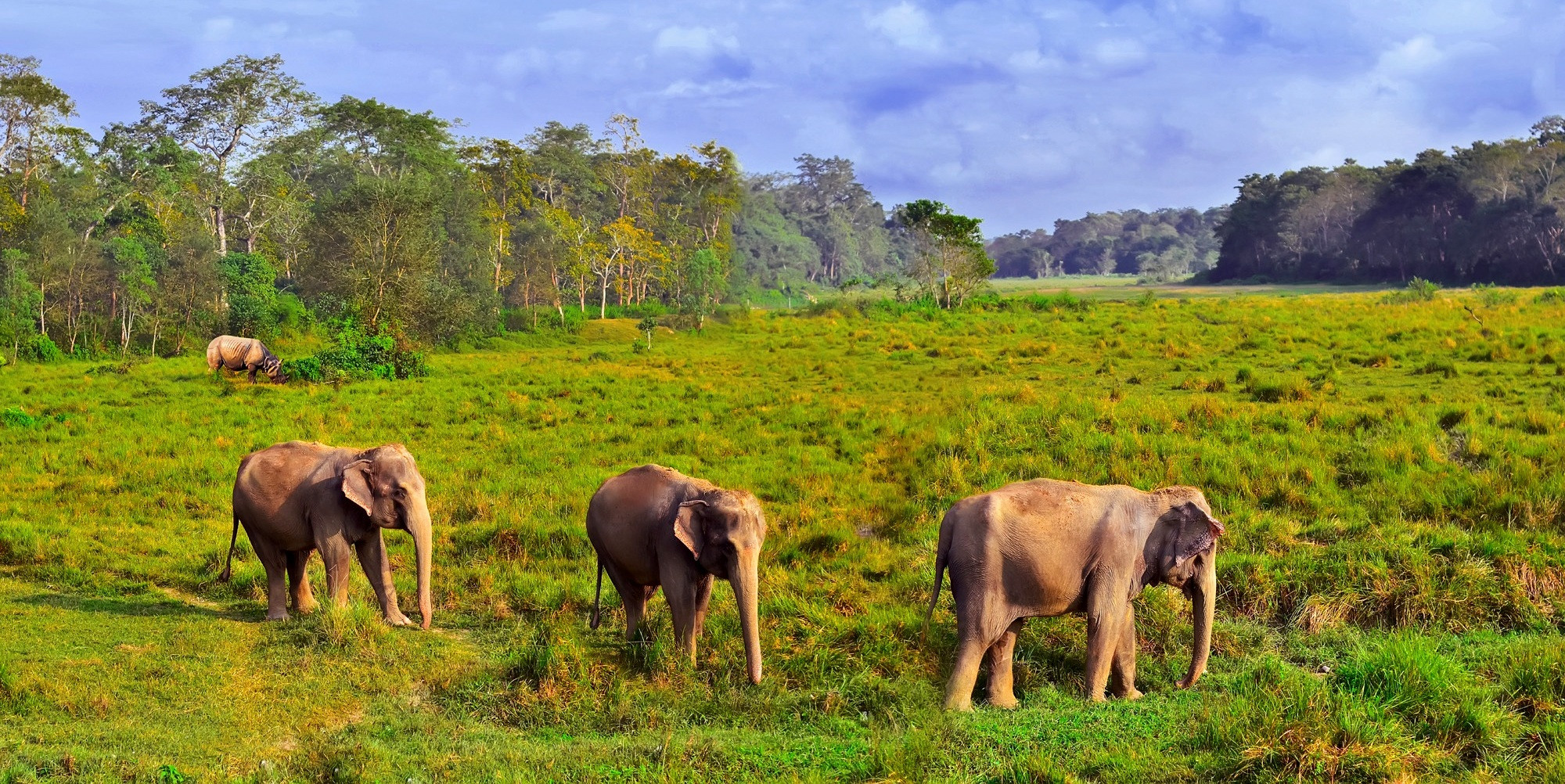
-
Rich Photographic Subjects: Chitwan National Park is home to an impressive array of wildlife, including the iconic Royal Bengal tiger, the one-horned rhinoceros, and the Asiatic elephant. In addition to these larger animals, the park hosts several species of deer, monkeys, and if you’re lucky, the elusive leopard. Bird photographers will also find Chitwan a paradise, with over 500 species of birds, including peacocks, hornbills, and various migratory species.
-
Optimal Shooting Conditions: The best time for wildlife photography in Chitwan is during the early mornings and late afternoons when the light is soft and golden, providing ideal lighting for photography. These times are also when animals are most active, increasing your chances of capturing them in natural behaviors.
-
Professional Guiding Services: Employing a guide with experience in wildlife photography can greatly enhance your chances of finding the best spots and moments to capture. Guides are knowledgeable about animal behavior and park geography, which can help you be at the right place at the right time. Many of the guides are also photographers themselves and understand the needs and challenges of wildlife photography.
-
Gear and Preparation: A successful wildlife photography trip requires appropriate gear. A good DSLR or mirrorless camera with a telephoto lens (at least 200mm, though 400mm or more is ideal) is essential for capturing detailed images of wildlife from a safe distance. Bringing additional equipment like a tripod, extra batteries, and memory cards will ensure you are prepared for long days in the field. It’s also advisable to have protective gear for your equipment against dust and moisture.
-
Ethical Photography Practices: When engaging in wildlife photography, it's crucial to maintain a respectful distance from the animals to avoid causing them stress or altering their natural behaviors. Use of flashes is generally discouraged as it can disturb the animals. Always prioritize the welfare of the wildlife over getting the perfect shot.
-
Enhancing Your Skills: For those looking to improve their wildlife photography skills, Chitwan offers various workshops and tours specifically tailored to photography. These can provide valuable on-the-ground training and insights from professional wildlife photographers.
Wildlife photography in Chitwan is not just about capturing the beauty of the animals, but also about documenting the extraordinary biodiversity of this protected area. Each photograph taken contributes to the appreciation and understanding of Nepal's wildlife and the importance of conservation efforts. Whether you're capturing a rhino's thick hide, a tiger's intense gaze, or the vibrant plumage of a native bird, Chitwan provides a spectacular backdrop for all your wildlife photography endeavors.
Chitwan Elephant Breeding Center
The Chitwan Elephant Breeding Center is a significant conservation facility located near Sauraha, just outside of Chitwan National Park. Established to protect and increase the population of Asian elephants, which are an endangered species, the center plays a crucial role in the research, breeding, and management of elephants. Here's what visitors can expect and learn from a visit to this important conservation site:
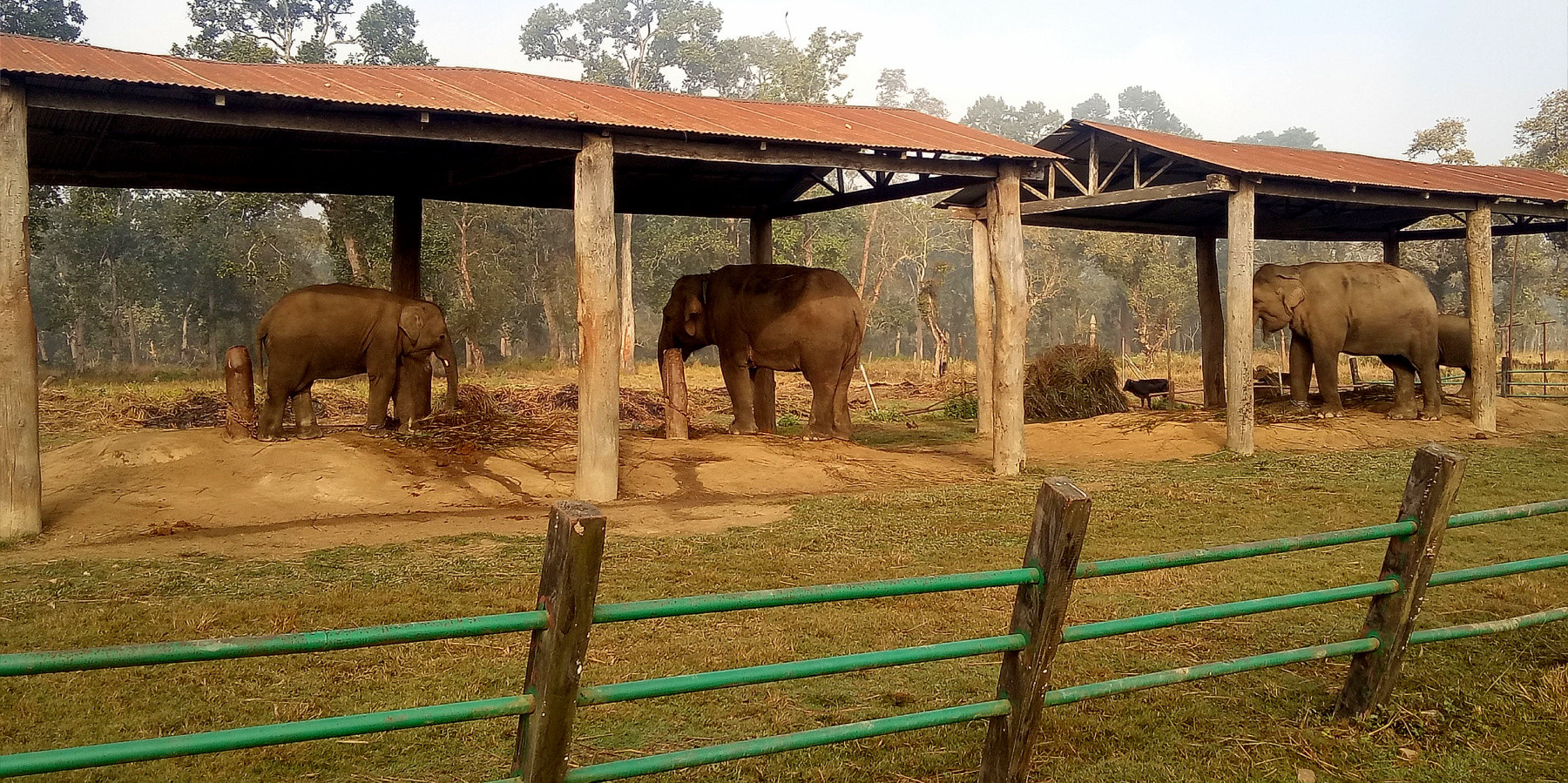
-
Purpose and Mission: The main goal of the Chitwan Elephant Breeding Center is to breed elephants in a safe environment, ensuring the survival of the species and providing healthy elephants that can live in the wild or assist in conservation efforts within the park. The center also focuses on studying elephant behavior and genetics, which are critical for effective conservation strategies.
-
Educational Tours: Visitors to the Elephant Breeding Center can take guided tours where they can learn about the challenges of elephant conservation, the breeding process, and the daily care of elephants. These tours are incredibly informative, offering insights into the life cycle of elephants, their social structures, and the veterinary care they require.
-
Meeting Elephants: One of the highlights for visitors is the opportunity to see elephants up close, including calves and their mothers. Observing the younger elephants play and interact with each other is not only endearing but also educative, as it provides a glimpse into their development and behavior.
-
Contribution to Conservation: The center contributes significantly to the conservation of Asian elephants by working to increase their population in a controlled and scientific manner. This is crucial, considering the declining numbers of wild elephants due to habitat loss, poaching, and human-wildlife conflict.
-
Support for Research: By visiting the breeding center, tourists support the ongoing research and conservation efforts financially. The funds raised from tours help in the upkeep of the facility and the care of the elephants, furthering the research needed to enhance conservation strategies.
-
Interactive Experiences: While at the center, visitors may have the chance to participate in feeding sessions or observe training exercises, which are essential for the elephants' mental and physical health. These interactions are designed to be educational and enriching for both the visitors and the elephants, emphasizing respectful and ethical engagement.
-
Ethical Considerations: It's important for visitors to recognize the ethical considerations in wildlife tourism. The Chitwan Elephant Breeding Center is committed to ethical practices, focusing on the well-being of the elephants and ensuring that interactions are conducted in a manner that respects their natural behavior and habitat.
A visit to the Chitwan Elephant Breeding Center is not only a unique opportunity to see these magnificent creatures up close but also a chance to learn about and contribute to the vital conservation efforts that ensure their survival for generations to come. It's a must-visit for anyone interested in wildlife conservation and the role that specialized breeding programs play in it.
Tips for Things to Do in Chitwan
When visiting Chitwan National Park, there are numerous activities and experiences to ensure a memorable trip. To make the most of your visit, here are some essential tips for enjoying the various things to do in Chitwan:
-
Plan Your Visit During the Optimal Season: The best time to visit Chitwan is from October to March. During these months, the weather is cooler and drier, making it more comfortable for outdoor activities and increasing your chances of spotting wildlife as they come out to bask in the sun and visit water sources.
-
Book a Guided Safari Tour: Whether you choose a jeep, elephant, or walking safari, having a knowledgeable guide is invaluable. Guides can enhance your experience by providing insights into the wildlife and flora of the park and helping you spot and identify animals that you might otherwise miss.
-
Respect Wildlife and Local Guidelines: Always maintain a safe distance from animals and follow the park rules. Use of flash in photography is generally prohibited to avoid startling the animals. Listen to your guide’s instructions at all times to ensure your safety and the well-being of the wildlife.
-
Explore the Local Culture: Don’t miss the Tharu Cultural Experience. Visit a local village to see their unique houses, enjoy traditional dances, and learn about the Tharu people's way of life, which is closely intertwined with the jungle environment.
-
Take a Canoe Trip: A canoe trip on the Rapti River offers a peaceful way to observe the park's rich birdlife and aquatic animals. Early morning or late afternoon is the best time for these trips when the animals are most active.
-
Dress Appropriately: Wear comfortable, breathable clothing in neutral colors that blend with the natural environment. Sturdy walking shoes are a must for jungle walks. Don’t forget to bring a hat, sunglasses, and sunscreen.
-
Stay Hydrated and Protected: The heat and humidity in Chitwan can be intense, especially outside of the winter months. Carry plenty of water, use sunscreen liberally, and consider insect repellent to protect against mosquitoes, especially near the river and during the evenings.
-
Bring the Right Gear: If you're interested in wildlife photography, a good camera with a zoom lens is essential to capture quality images from a safe distance. Binoculars can also enhance your viewing experience, especially for bird watching.
-
Visit the Elephant Breeding Center: Learn about the conservation efforts being made to protect and breed the endangered Asian elephant. It's educational and supports conservation initiatives.
-
Prepare for the Unexpected: The jungle environment is unpredictable. Weather can change quickly, and wildlife sightings are never guaranteed. Approach each activity with an open mind and flexibility, and enjoy the experience of being in one of Nepal’s most beautiful natural environments.
By following these tips, you can ensure a richer, more enjoyable, and respectful visit to Chitwan National Park, making your trip not only a memorable adventure but also a contribution to the conservation efforts in the region.
Best Time for Things to Do in Chitwan
Visiting Chitwan National Park can be a distinct experience depending on the season. Each part of the year offers unique opportunities and challenges, catering to different interests and preferences. Here's a breakdown of what to expect in Chitwan during each season:
Dry Season: October to March
-
Weather: This is the most favorable time for visiting Chitwan due to the cool and dry weather. Temperatures are mild, making it ideal for spending extended periods outdoors.
-
Wildlife Viewing: Visibility is excellent because the vegetation is less dense and animals frequently come to water sources to drink, making them easier to spot.
-
Activities: All the park activities, including jeep safaris, canoe trips, elephant safaris, and jungle walks, operate at full capacity. This is also the best time for bird watching as migratory birds are present.
-
Tourist Volume: This period sees the highest number of visitors, especially during the peak months of December to February, so expect more crowds and book accommodations in advance.
Hot Pre-Monsoon Season: March to May
-
Weather: Temperatures rise significantly, making midday activities potentially uncomfortable. The heat peaks in May, just before the monsoon starts.
-
Wildlife Viewing: Increased temperatures mean animals are more likely to be seen around water bodies during the cooler times of day, such as early mornings and late afternoons.
-
Activities: Morning and evening are the best times for safaris and other activities. This is also a fantastic season for bird watchers, as it coincides with the arrival of spring migratory birds.
-
Scenery: The park begins to dry out, but the initial months still retain some of the lushness left from the cooler months.
Monsoon Season: June to September
-
Weather: The monsoon brings heavy rains, high humidity, and warmer temperatures. The rain is typically heaviest in July and August.
-
Wildlife Viewing: Dense vegetation can make wildlife harder to spot, but the park is lush and green, offering beautiful landscapes.
-
Activities: Some trails and areas may be inaccessible due to the rain. However, fewer tourists mean a quieter experience and the opportunity to see the park in its most fertile state.
-
Considerations: Many facilities might reduce their activity offerings, and access roads can be muddy and slippery.
Post-Monsoon Season: September to Early October
-
Weather: The end of the monsoon sees a decrease in rain and a gradual cooling of temperatures. This time is a transition between the lush wetness of the monsoon and the approaching dry season.
-
Wildlife Viewing: As the water levels recede, wildlife begins to become more active and visible. The park's flora is still vibrant and dense, which can make spotting animals challenging but also more rewarding.
-
Activities: This is an excellent time for those looking to enjoy the natural beauty with fewer crowds. The conditions for safaris and walks improve as the season progresses.
-
Scenery: The park remains green and full of life, with water bodies still brimming from the monsoon rains.
Each season in Chitwan offers a unique charm and set of experiences. Whether you prefer the bustling wildlife activity of the dry season, the vibrant landscapes of the monsoon, or the heat and birdlife of the pre-monsoon period, planning your visit according to the seasonal characteristics can enhance your experience of this magnificent national park.
Chitwan National Park is a vibrant and diverse destination that caters to a wide range of interests. Whether you're drawn to wildlife safaris, cultural experiences, or nature walks, Chitwan offers unique opportunities to immerse yourself in the beauty of both nature and local traditions. Each season brings its own charm, from the optimal wildlife viewing during the cooler months to the lush landscapes of the monsoon. Activities like bird watching and elephant encounters enrich the experience, making every visit to Chitwan memorable and inspiring. Whether for adventure, relaxation, or cultural exploration, Chitwan National Park is an unforgettable destination that educates and delights its visitors.
FAQs for Things to Do in Chitwan
Q: What are the top activities to do in Chitwan National Park?
A: The top activities in Chitwan include wildlife safaris (either by jeep, on elephant back, or on foot), canoe trips on the Rapti River, bird watching, visiting the Elephant Breeding Center, and experiencing Tharu cultural shows.
Q: When is the best time to visit Chitwan National Park?
A: The best time to visit Chitwan is from October to March when the weather is cooler and dry, making it ideal for jungle safaris and other outdoor activities. This period also offers the best wildlife viewing opportunities.
Q: How can I get to Chitwan National Park?
A: Chitwan National Park is accessible by road and air. It is approximately a 5-6 hour drive from Kathmandu or a short flight to Bharatpur Airport, followed by a brief road journey to the park.
Q: What kind of wildlife might I see in Chitwan?
A: Chitwan is home to diverse fauna, including the Royal Bengal tiger, one-horned rhinoceros, Asiatic elephant, several deer species, sloth bears, and over 500 bird species.
Q: Are there any specific health precautions I should take when visiting Chitwan?
A: Visitors should take precautions against mosquitoes and other insects, which can be abundant in the park. Using insect repellent, wearing long sleeves and pants, and staying in screened or air-conditioned accommodations are recommended.
Q: Is it safe to visit Chitwan National Park?
A: Chitwan is generally safe for visitors. However, as with any wildlife area, it's important to follow park rules and guidelines, especially on safaris. Always listen to your guide, stay inside the vehicle, and keep a safe distance from wild animals.
Q: What should I bring for a day out in Chitwan?
A: For a day in Chitwan, bring sunscreen, insect repellent, a hat, sunglasses, and a refillable water bottle. Also, wear comfortable clothing in muted colors to blend into the environment and sturdy shoes for walks. Don't forget your camera and binoculars for wildlife viewing and bird watching.
Q: Can I interact with elephants at Chitwan?
A: While you can see elephants at the Elephant Breeding Center and during elephant safaris, interactions are managed to ensure the safety of both the animals and visitors. It’s important to follow the guidelines provided by your tour operator or the park management.
For the Nepal tour, please click here.
If you are looking for different kinds of Nepal Tours or Trekking Packages, feel free to contact us.
